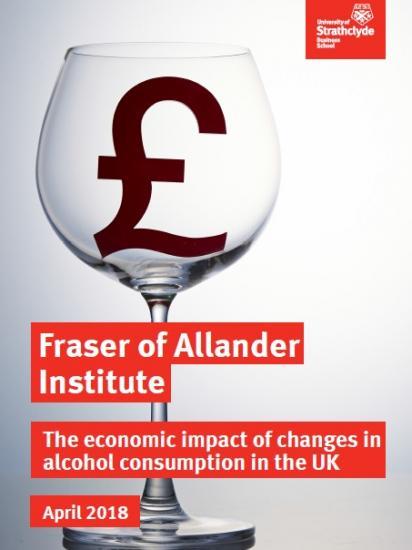The economic impact of changes in alcohol consumption in the UK
30th April 2018

The Fraser of Allender Institute has produce a report looking at the possible economic impact of changes in alcohol consumption.
The alcohol industry (both manufacturing and sales) is important to the UK Economy as it supports thousands of jobs (IAS, 2017a; Oxford Economics, 2016). However, there are many well documented adverse effects of high alcohol consumption, most notably on public health. With the UK having one of the highest alcohol consumption rates in the world, recent Government policy has sought to address some of this harm. Changes in policy and social attitudes may result in changes in UK alcohol consumption. The focus of this report is to examine the potential macroeconomic impact from changes in UK alcohol consumption. Previous studies
(WTSA, 2013) have investigated the gross impacts resulting from changes in consumption - that is, the impact of the alcohol sector without considering reallocation of spending to other goods and services. This report extends the literature and investigates the net impacts by including the redistribution of both household and government income.
This report uses Input-Output (IO) methodology (with disaggregated alcohol sales sectors), which allows for a range of scenarios to be modelled, including:
■ A reduction in alcohol consumption without reallocation of saved income. This corresponds broadly to the standard IO analysis of a sector's economic gross impact.
■ A shift in tastes away from alcohol consumption and in favour of other goods. In the first scenario, to isolate the impact, the assumption is made that households save all of the income that would otherwise have been spent on alcohol. However, this is highly unlikely and, in practice, it would be expected that households would spend the income on other goods and services. In this report, several reallocations of spending are carried out to estimate the net impact of the reduction in alcohol consumption.
■ A shift in tastes away from on-trade to off-trade consumption. In addition to an overall reduction in consumption, recent trends indicate an increase in off-trade sales coupled with a decrease in on-trade sales.
■ Introduction of higher alcohol duty with and without the spending of additional government revenues.
Analysing the results of these scenarios we can reach several conclusions:
1. The economic effects of a reduction in alcohol consumption without reallocation of saved income to other goods and services is - as would be expected - strictly negative. A 10% reduction in alcohol sales results in a GVA (Gross Value Added) fall of £2.6 billion and a loss in employment of 63,300 FTEs (full-time equivalent jobs).
2. The impact of a shift in tastes away from alcohol, with household spending reallocated to other goods and services is ambiguous and dependent upon the industries to which spending is reallocated. With a 10% reduction in spending on alcohol, and depending on which sectors absorb additional demand, GVA impact ranges between +£1025 million and -£1711 million, and employment impact ranges between +49,500 FTEs and -54,500 FTEs. These are the high and low bounds on the GVA and employment effects, but in a more plausible set of scenarios in general we observe a positive GVA impact and a negative employment impact, i.e. fewer but better paying and more GVA-intensive jobs. This is not surprising as alcohol sales (in general) are relatively less GVA-intensive, but more labour-intensive.
3. A shift in tastes towards off-trade sales and away from on-trade - a trend apparent in recent data - has an overall negative effect, as households are effectively spending less due to off-trade alcohol being cheaper than on-trade. If 10% of alcohol sales by volume are shifted from on-trade to off-trade the result is a reduction in GVA of £1.5 billion and a loss in employment of 40,270 FTEs. These results are lower than a simple 10% reduction in consumption but are still substantial, demonstrating that the on-trade sector is much more GVA and labour intensive than the off-trade.
4. An increase in the UK alcohol duty rates, without the recycling of additional tax revenues, leads to a reduction in alcohol consumption due to higher alcohol prices without other effects, similar to the first scenario. A 10% increase in the alcohol duty results in a reduction in both GVA of £294 million and employment of 7,320 FTEs. However, if the government spends additional revenues from higher tax, following the pattern of their base-year spending, then the net economic impact of higher alcohol tax becomes positive with an increase in GVA of £847 million and a gain of 17,040 FTEs. This suggests that such a policy could possibly simultaneously reduce alcohol consumption, with attendant health benefits, and stimulate economic activity: a kind of "double dividend".
This report expands on standard IO impact analysis by ncorporating changes in tastes, reallocation of consumption and investigating the impact of government policy. However, there are many economic effects that this analysis cannot take into account due to the limitation of the IO framework. Future research should explore the impact of relaxing some of the assumptions, particularly input-output's assumption of an entirely passive supply side (i.e., no supply constraints and as a consequence, fixed prices). In addition, further research into the negative economic impact of alcohol consumption's harmful health effects (e.g. sickness, absenteeism, unemployment etc.) is necessary, but beyond the scope of this report.
See the full report at https://www.sbs.strath.ac.uk/economics/fraser/20180411/The-economic-impact-of-changes-in-alcohol-consumption-in-the-UK.pdf
